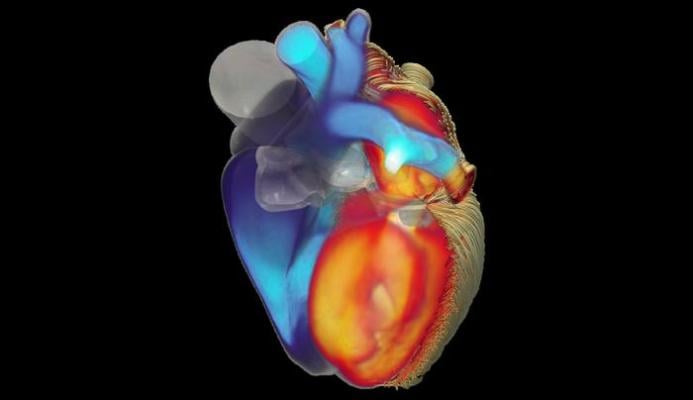
A mathematical and computational model of the human heart entirely developed at Politecnico di Milano and designed for studying coronary artery disease. Image courtesy of Politecnico di Milano
September 19, 2023 — A mathematical and computational model of the human heart entirely developed at Politecnico di Milano and designed for studying coronary artery disease. This is the focus of research published in the prestigious journal Nature Scientific Reports, entitled 'A comprehensive mathematical model for cardiac perfusion'. The project was born from collaboration between the MOX lab of the Department of Mathematics and the LaBS of the Department of Chemistry, Materials and Chemical Engineering 'Giulio Natta' of Politecnico di Milano, and now presents the results of the iHEART Simulator.
What makes iHEART Simulator unique is its ability to combine the complex processes of electromechanics, haemodynamics and cardiac perfusion into a single platform. This level of integration offers unprecedented biophysical accuracy in the simulation of heart function and related diseases.
One of the most innovative aspects of this study is the application of this model to the analysis of coronary artery disease, such as ischaemia and acute myocardial infarction. Thanks to the iHEART Simulator, researchers will be able to study these diseases in a more detailed and accurate manner, paving the way for new therapies.
In collaboration with the IRCCS Ospedale San Raffaele di Milano and Humanitas Research Hospital in Milan, the iHEART project has also developed mathematical models to understand cardiac arrhythmias such as ventricular tachycardia or atrial fibrillation. These models have made it possible to identify key factors in the onset and maintenance of arrhythmias. It has thus been demonstrated that cardiac mathematics is able to support and consolidate the electrophysiological study in the localisation of intervention areas on the heart wall. In addition, increasingly faster algorithms are also being studied and are in an advanced developed phase; they will allow this type of analysis to be carried out in real time, significantly speeding up the surgery decision-making process.
In collaboration with Ospedale Sacco di Milano, a model was also developed to guide cardiac surgeons in removing part of the interventricular septum to treat hypertrophic obstructive cardiomyopathy. Mathematical simulation is part of the pre-operative phase, and has been considered by doctors as an effective guidance tool for this delicate surgery.
In collaboration with Ospedale Santa Maria del Carmine in Rovereto (Trento province), a mathematical tool was created to optimize cardiac resynchronization therapy. This reduces the time for mapping the left ventricle, which is necessary for implanting a resynchronization device, and thus also reduces the patient’s exposure time in invasive treatments, and guides the placement of the catheter in the most curative location for the decompensated patient.
iHEART Simulator is the result of years of research within the 'iHEART' (Integrated Heart) project funded by the European Union through an ERC Advanced Grant. The project, directed and coordinated by Professor Alfio Quarteroni, ran from 2017 to 2023, and aimed to develop the first comprehensive mathematical model of the human heart and its diseases.
The results of this study were presented in a Plenary Lecture by Professor Quarteroni at ICIAM 2023 Conference in Tokyo, where he was awarded the prestigious Lagrange Prize by the International Council for Industrial and Applied Mathematics (ICIAM).
For more information: https://www.polimi.it/en


 February 03, 2026
February 03, 2026 









